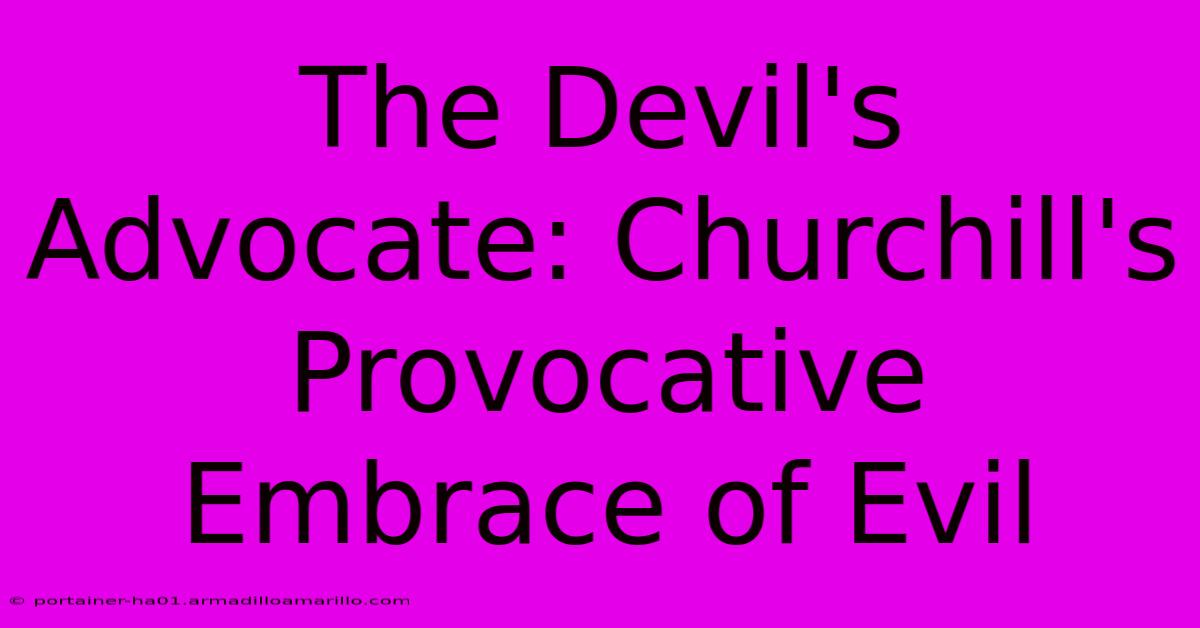The Devil's Advocate: Churchill's Provocative Embrace Of Evil

Table of Contents
The Devil's Advocate: Churchill's Provocative Embrace of Evil
Winston Churchill, a name synonymous with British defiance and wartime leadership, remains a complex and controversial figure. While lauded as a savior of democracy, a closer examination reveals a darker side: his willingness to flirt with, even embrace, "evil" in the pursuit of victory. This isn't about demonizing the man, but rather understanding the morally ambiguous choices he made and their lasting implications. This exploration delves into Churchill's pragmatic approach to wartime strategy, highlighting instances where his actions challenged conventional notions of morality and ethics.
The Pragmatism of War: Justifying the Unjustifiable?
Churchill's political career was punctuated by a staunch realism. He believed that the ends – securing victory and protecting Britain – often justified the means, even if those means were morally questionable. This pragmatic approach is evident in several key decisions:
Supporting Authoritarian Regimes:
During World War II, Churchill forged alliances with some unsavory characters. His collaboration with Joseph Stalin, a brutal dictator responsible for the deaths of millions, is a prime example. While the alliance was crucial to defeating Nazi Germany, it involved a degree of moral compromise that continues to spark debate. Churchill's pragmatic justification centered on the greater good: the defeat of a far greater evil. But was this a sufficient justification? Did the ends truly justify the means, or did the alliance ultimately compromise British moral standing?
Strategic Bombing and Civilian Casualties:
The devastating bombing campaigns against German cities resulted in immense civilian casualties. While strategically aimed at disrupting war production, these attacks were undeniably horrific. Churchill defended the bombings as a necessary evil, arguing that they hastened the end of the war and ultimately saved more lives. However, the moral cost remains a subject of intense scrutiny. Was the minimization of German military capacity worth the immense human suffering inflicted on civilians?
The Bengal Famine:
The devastating Bengal famine of 1943 resulted in the deaths of millions. Critics argue that Churchill's policies, prioritizing military supplies over civilian needs, contributed significantly to the catastrophe. While the complexities of the famine are undeniable, accusations of intentional neglect, even indifference, towards the suffering of the Indian population, persist. The debate continues as to whether Churchill's actions constituted a crime against humanity, or if it was a tragic byproduct of wartime resource allocation.
The Legacy of Moral Ambiguity: A Lasting Debate
Churchill's legacy is intrinsically intertwined with his willingness to navigate the murky waters of wartime morality. His actions, while arguably necessary within the context of the war, raise important questions about leadership, morality, and the ultimate cost of victory. The debate surrounding his decisions remains highly relevant today, particularly in the context of modern conflicts and the complexities of international relations.
Re-evaluating Historical Narratives:
The tendency to idealize historical figures often overlooks the less palatable aspects of their leadership. A critical examination of Churchill's actions compels us to question the traditional narratives surrounding his life and legacy. This involves acknowledging the morally ambiguous choices he made and their long-term consequences.
The Importance of Critical Thinking:
Churchill's story serves as a powerful reminder of the importance of critical thinking when assessing historical figures and their actions. It underscores the need to move beyond simplistic narratives and grapple with the complexities of ethical dilemmas, especially those encountered during times of war.
Conclusion: A Necessary Devil?
Churchill's embrace of morally questionable tactics, while controversial, can be viewed through the lens of pragmatic wartime strategy. His unwavering resolve to defeat Nazi Germany often led him to make difficult choices, prioritizing the overall victory over strict adherence to moral absolutes. However, understanding this pragmatic approach does not absolve him of responsibility for the consequences of his actions. The legacy of Winston Churchill remains a complex tapestry woven with threads of heroism and moral ambiguity, prompting a continuous reassessment of his role in shaping the 20th century. The debate continues, and perhaps should, ensuring that his story serves as a cautionary tale as well as an inspiration. The question remains: was he a necessary devil, or a leader whose pragmatic approach ultimately overshadowed his moral compass? The answer, like the man himself, is complex and multifaceted.

Thank you for visiting our website wich cover about The Devil's Advocate: Churchill's Provocative Embrace Of Evil. We hope the information provided has been useful to you. Feel free to contact us if you have any questions or need further assistance. See you next time and dont miss to bookmark.
Featured Posts
-
Insiders Guide Jotun Price Predictions For 2024 Brace For A Rollercoaster
Feb 07, 2025
-
The Ultimate Glow Up Dnd Nail Lamp Hacks For Shimmering Healthy Nails
Feb 07, 2025
-
The Power Of Landscaping Business Cards Amplify Your Marketing Efforts
Feb 07, 2025
-
Stunning Shades Unmatched Durability The Ultimate Guide To Dnd Dc Gel Polish
Feb 07, 2025
-
Color Code Craze The Ultimate Guide For Bunting Manufacturers To Boost Visibility
Feb 07, 2025
